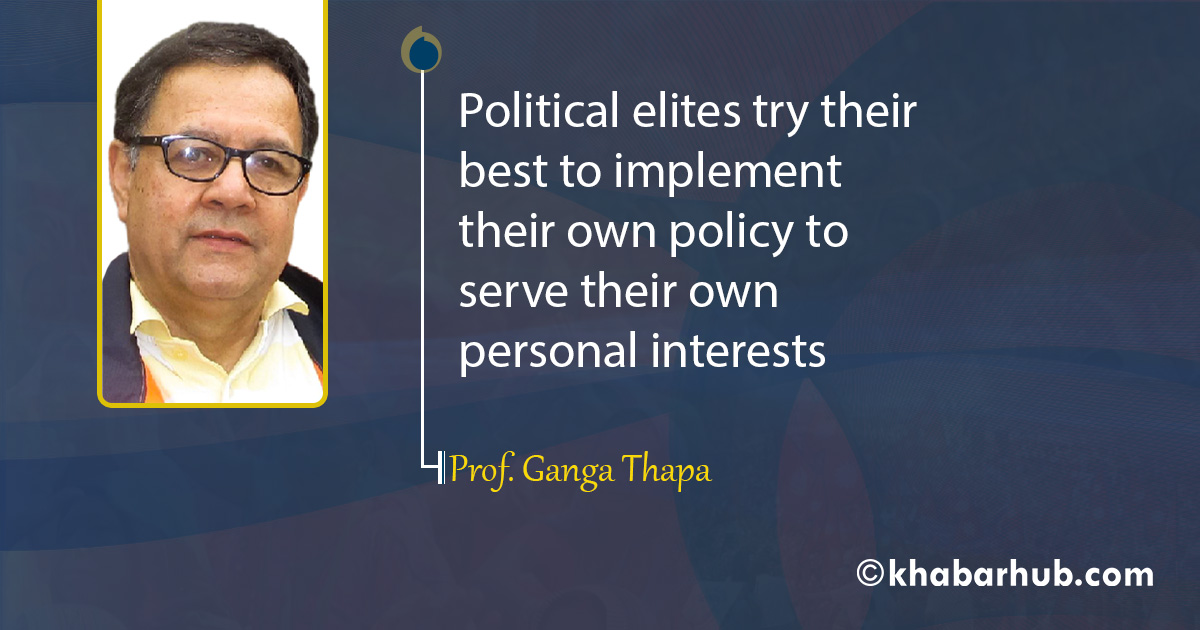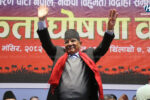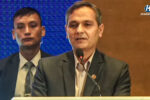Liberty, equality, individualism, democracy, and rule of law propose for reconciliation-based politics and a political culture fully encouraging a public-policy discourse at multiple levels of the intelligentsia and common citizens what Rawls calls it a ‘reasonable pluralism’.
This is how peace, stability, and prosperity make a bond and hold together without being assimilated as to lose respective identity or getting fragmented once again to lose respective identity. Ordinary citizens can participate in our democratic system only through devolutionary politics where they have a say in formulating public policies and thus project a humanistic vision of democratic politics. This is a genuine democracy.
Political elites try their best to implement their own policy to serve their own personal interests and hence, the performance of democracy suffers.
For most political scientists concerned with Nepal’s democratization pay attention to the existing state of tolerance. The Chinese call it a state of open heart-and-mind. It is a sincere commitment to social justice. A culture of tolerance further denotes a set of moral and legal rights along with responsibilities which help achieve pluralism at all level with all the diverse and multiple viewpoints, sustainable economic development and thereby expanding democracy much more to serve society.
Political elites try their best to implement their own policy to serve their own personal interests and hence, the performance of democracy suffers. There are anti-democratic elements within the country who will continue to manipulate and repress the autonomy of public institutions committed to promoting people-oriented approaches. Most importantly, for those political parties which are supposed to be champions of democracy are yet to devise more effective strategies of cooperation, tolerance and conflict management. Their main concern at the moment seems to be keeping their offices running to perpetuate their own narrow party interests.
The aim was to enable people to make decisions and participate in the governmental process with a structured and informed set of beliefs about the political world.
One of the major breakthroughs of Nepali democracy is the abolition of two hundred and fifty years’ old monarchy. The Shah-monarchy was incapable of understanding that politics cannot be sealed off from the impact of public opinion and participatory attitudes. This is one of the reasons why Nepal introduced a federal system of governance to empower the capacity of people. The aim was to enable people to make decisions and participate in the governmental process with a structured and informed set of beliefs about the political world.
Even though potential challenges are there in the difficult and bumpy road ahead, the political transformation of Nepal since 1990 has opened what we may call a ‘window of opportunity’ to move quickly and decisively from the old system towards political and economic reforms which will set a stage for prosperous Nepal. I do not consider King Birendra a wise king because he gave in to the demands of democracy only after a bloody protest in 1990 though he was more popular and also commanded respect much more than King Gyanendra who in turn sacked the elected government only to seize power in 2005. Then came the infamous Royal Massacre which disclosed the ugly face of palace conspiracy within the monarchy.
This state illiberal democracy will make Nepal vulnerable to power and manipulation that challenge mainstream conceptions of inclusive democracy.
How democratic is Nepal is perfectly a legitimate academic discourse? Many observers have come to believe that the democratic political system is slowly being replaced by parochial politicians focused on narrow political interests. Major political decisions of national and international implications are being made by a small group keeping their narrow party and personal interests in mind. All this is happening because of the dysfunctional political institutions. However, ‘dysfunctional’ does not necessarily mean ‘undemocratic’.
In Bartels’s (2008) phrase, the politics of inaction leads to the poor performance of state institutions and foster patrimonialism at the expense of healthy development of institutions. The changes that have been taking place in Nepal, some speculate that it has met with some kind of ‘illiberal democracy’. It is emerging as the ‘grey zone’ between ‘democratic authoritarianism’ and ‘hegemonic liberalism’. This state illiberal democracy will make Nepal vulnerable to power and manipulation that challenge mainstream conceptions of inclusive democracy.
Perhaps the questions should be posed like this – ‘what’s undemocratic about the current Oli administration? A comparative study of political transitions in Nepal reveals that even key political players are divided among themselves. Free exchange of views among political groups having different ideas is not happening. This is where all of us are looking to take steps to avoid further failure in the political stability of Nepal.









Comment